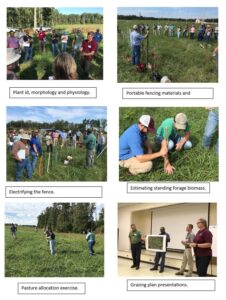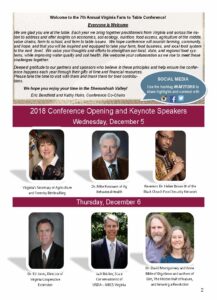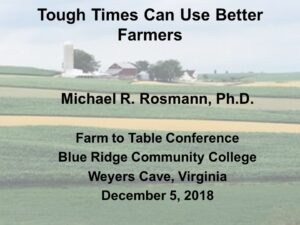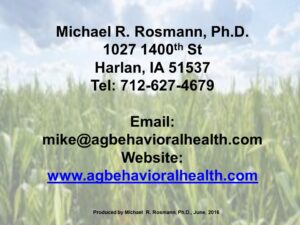Final report for SVA18-001
Project Information
- at least one hundred Extension Agents (VCE)
- Twenty Farm Service Agency (FSA) personnel and Farm Credit system personnel
- Fifty Natural Resource Conservation Service (NRCS) and Soil and Water Conservation District personnel
Advisors
- (Educator)
- (Educator)
- (Educator)
- (Educator and Researcher)
- (Educator)
- (Educator)
- (Educator)
- (Educator)
- (Educator)
- (Educator)
- (Educator)
Education
Education & Outreach Initiatives
To strengthen Virginia's educational and outreach network of educators and practitioners of soil health and cover cropping systems to include Extension, USDA-NRCS, Soil and Water Conservation Districts, and mentor farmers to create more resilient and viable farming systems for agronomic, livestock, and horticultural operations across the state.
Soil, water, and air cannot be taken for granted. Soils must be sustained and regenerated for farming and the overall health of the population to remain strong in the 21st century. Sound ecological soil management that includes minimizing soil disturbance and keeping soils covered to prevent losses and build soil health continues to be an educational and outreach priority of Virginia’s Sustainable Agriculture Research and Education (SARE) Program. Peer-to-peer learning and training around core soil health principles were a key emphasis of professional development programming. In 2018 – 2019, Virginia SARE provided professional development training related to soil health and cover cropping systems for Extension educators, USDA professionals, and mentor farmer-leaders by providing travel scholarships and conference registration support to the 2018 Virginia Farm to Table Conference, the Real Dirt on Dirt and Soil Health Workshop at Virginia State University with David Montgomery, Anne Bikle, and Alan Franzluebbers, the Virginia Association for Biological Farming's 2019 Annual Conference, the Virginia Urban Agriculture Summit, and the Virginia Forage and Grassland Council's 2018 and 2019 Grazing School for Agricultural Professionals on Sustainable Grazing and Grassland Management Education.
In December 2018, the Virginia SARE helped to provide professional development on soil health and cover cropping to an audience of 101 extension agents and specialists and USDA-NRCS staff as part of the Virginia Farm-to-Table Conference and the Real Dirt on Dirt Workshop. These events featured Dr. David Montgomery, Anne Bikle, Dr. Alan Franzluebbers, and noted practitioners like Patryk Battle of Living Web Farms, Mark Dempsey of Carolina Farm Stewardship Association (CFSA), Bill Patterson of USDA-NRCS, and leading farmers in soil health promotion. These educational events were especially successful
in building partnerships and expanding understanding of soil health and its relevance to farming and Virginia's water quality improvement plans among farmers and key decision makers. The two-day farm-to-table conference featured 4 concurrent sessions and 18 training tracks; was attended by 240 people, and provided professional development training to 55 Extension and USDA-NRCS professionals. The Real Dirt on Dirt and Soil Health Workshop held on December 7 was attended by 46 Extension and NRCS staff and 104 people overall. Deputy Secretary of Natural Resources for the Chesapeake Bay Ann Jennings and Commissioner of the Department of Agriculture and Consumer Services Dr. Jewell Hairston Bronaugh shared their perspectives and insights. There are ongoing conversations with the Deputy Secretary on possible funding for soil health through Virginia's nutrient management program.
Virginia SARE leveraged its educational resources this programming year and was able to highlight the separate research and educational efforts of SARE and its conservation partners.
Virginia SARE's annual plan of work involves facilitating professional development training opportunities for
Extension and USDA professionals and farming leaders. The conferences attended, number of attendees,
and estimated hours of professional development training for 2018 relating to soil health and cover cropping were as follows: Virginia Forage and Grassland Conference Grazing School for Agricultural Professionals on Sustainable Grazing and Grassland Management Education, Blackstone and Steeles Tavern, VA (n = 45; Est. hours of training 540), Virginia Association for Biological Farming, Richmond, VA (n=11; Est. hours = 88), 2018 Virginia Farm to Table Conference, Weyers Cave, VA (n =55; Est. hours = 660), and the Real Dirt on Dirt and Soil Health Workshop, Petersburg, VA (n = 46; Est. hrs. = 184).
Virginia SARE collaborated with Dr. Wade Thomason of Virginia Tech and Chris Lawrence of Virginia USDA-NRCS to promote the VA Cover Crop College educational program and the 7 full-day sessions of VA Cover Crop 101 that were offered across the state between late January and mid-April 2019. According to Dr. Thomason and Chris Lawrence, approximately 200 VA PDP audience personnel including VCE, NRCS, SWCD, and influential industry and farmers participated in this first cover crop college class. An emerging outcome of these collaborative efforts is that there is renewed interest in formalizing a Virginia Soil Health Coalition, which also resulted in a group of soil health collaborators and researchers developing and submitting a pre-proposal to a national foundation for funding consideration.
To provide comprehensive, pasture and grazing management training for agricultural professionals in Virginia
Based on an identified need to provide more comprehensive, pasture and grazing management training for agricultural professionals in Virginia, Virginia SARE partnered with the Virginia Forage and Grassland Council representatives (Extension, USDA, and farm leaders) to address this need and support the professional development training related to sustainable grazing and grassland management. Working in combination with the NRCS State Grazing Specialist, Extension Specialists and the expertise of key VFGC members and industry representatives, the existing producer-oriented grazing school materials and training format was modified to better meet the need of the agricultural professional.
Once the groundwork for the grazing school was in place, the speakers and training agenda and the training was promoted to the targeted professional group. Ultimately, there were a total of 45 agricultural professionals who work directly with forage and livestock producers throughout the state who attended a Fall 2018 training at the Southern Piedmont AREC and Extension Center in Blackstone, VA and a Spring 2019 training at the Shenandoah Valley AREC in Steeles Tavern, VA. The participants included soil conservationists, SWCD conservationists, Extension Agents, nutrient management specialists, and farm cooperative consultants who ranged in experience from 1-28 years with just greater than 60% of those attending having 5 years or less experience.
The participants received two full days of intensive training focusing on the principles of pasture and grazing management, complete with classroom instruction supplemented by field training exercises to reinforce the principles associated with soils, forages, plant growth, fencing and grazing management in a way that improves pasture condition and builds soil health in a sustainable manner while maximizing utilization of forage by the grazing livestock. On the second day, the students were divided into teams of 5 for the practical field exercise on a local farm. After conducting the pasture condition assessment, identifying resource concerns and assessing the existing forage species composition and production, the groups assembled in the classroom to draft grazing plan layouts and recommendations. The groups spent the last hour and a half presenting their plans to actual producers and landowners.
Based on the results of the pre- and post-evaluations, the participants confirmed that their knowledge and understanding of forages and grazing management increased and based on the knowledge and skills acquired at this grazing school, it will improve the quality of technical assistance and planning they will provide to the forage and livestock producers in their respective service areas.
The combined service area of the participating agricultural professionals covered 43 counties from different regions of the state, including two professionals with statewide responsibilities. The total service area represented by these agricultural and conservation professionals covers over 1,000,000 pasture acres on 9,000 cattle farms. The reach of these professionals has the potential to impact the management of almost 400,000 cattle, 14,000 sheep, 20,000 goats, and over 30,000 horses and ponies managed on these pasture acres.

To nourish farming, health, community, and hope by training Extension and USDA professionals on local and regional agriculture, ways of healthfully dealing with farming stressors, applying of core soil health principles, cover cropping, value-added products, fermented products, farm profitability, high tunnels, agroforestry, silvopasture, GRAZE 300, and other food and agricultural system topics.
To continue the conversation about and work on soil health, economic vitality, seasonality, sustainability, agroforestry/silvopasture, community food forests, and equity in the food system, while also addressing emerging issues of behavioral health and suicide in the farming community, Virginia SARE provided educational support for 55 Extension and USDA professionals to attend 2018 Virginia Farm to Table Conference. The conference is a two-day educational event hosted by Extension and Virginia USDA-NRCS as a professional development networking opportunity. Extension and USDA personnel learned from notable speakers and panelists: Dr. Mike Rosmann of Ag Behavioral Health, Reverend Dr. Heber Brown III of the Black Church Food Security Network, Dr. David Montgomery and Anne Bikle of the University of Washington and Dig2Grow, Dr. Elsa Sanchez and Dr. Beth Gugino of Penn State University, Steve Gabriel of Cornell Cooperative Extension and Wellspring Forest Farm, Catherine Bukowski author of Community Food Forest Handbook: How to Plan, Organize, and Nurture Edible Gathering Places.

The two-day conference featured 4 concurrent sessions and 18 training tracks and was attended by 240 people. Several Extension and USDA professionals connected with Dr. Mike Rosmann to discuss ways to address behavioral health and be a resource for the farming community. Additionally, four dairy farmers called Dr. Rosmann to seek help with regard to the crisis within the dairy sector.

